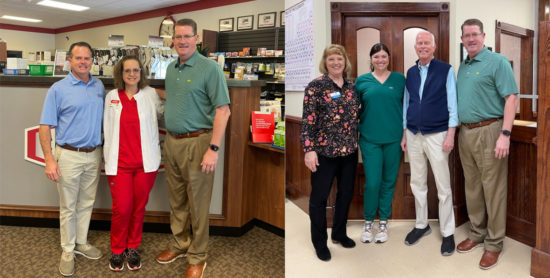PTSD in the ICU, a ‘plan A’ pill, is banning menthol racist? and more
27 Apr 2022
Posted by Andrew Kantor
A different kind of pill
On the horizon: An on-demand contraceptive pill.
A combination of ulipristal acetate and meloxicam, it’s “highly effective at disrupting ovulation at the point in the cycle when the risk of pregnancy is greatest, known as peak fertility.” It kinda sits in the niche between a daily pill and something like Plan B — taken on demand, but before it’s needed.
Although it was tested on humans (both drug are already approved), it’s still exploratory research. You know the mantra: Further studies are needed.
Covid updates a-plenty
I’ve been trying to keep Covid stories to a minimum simply out of fatigue. But — like an Indonesian volcano or Taco Bell buffet — eventually the pressure builds and there’s just too much to keep inside.
More than just stress
Families of Covid-19 patients admitted to the ICU have a serious risk of suffering from PTSD — or at least have “significant symptoms of posttraumatic stress disorder 3 months after the patients’ admission” according to a paper in JAMA Internal Medicine (by researchers from across the country).
The waiting is the smartest part?
It may have been better to space vaccine doses farther apart. A study out of the UK Health Security Agency found that waiting 10 weeks between doses, rather than two to four weeks, resulted in up to 11 times more antibodies.
It bears repeating yet again: Antibodies are only one measure of a vaccine’s effectiveness, and they wane after a few months anyway. Long-term T-cells remain regardless of the vaccine schedule.
There’s plenty of Paxlovid
For people who contract Covid and want to stay out of hospital, there’s Paxlovid — Pfizer’s antiviral pill. But demand is low, in part because “some physicians have been hesitant to prescribe it over concerns about depleting the supply.”
Fear not! says the White House — there’s plenty to go around and more pharmacies will be able to order it directly from the feds.
Your dog wants a vaccine
Vaccinating dogs (and other animals) against Covid-19 could prevent them from carrying the virus and transmitting it to humans. Korean veterinarians successfully vaccinated beagles using a dog-specific vaccine, allowing them to conclude that “reverse zoonosis of Covid-19 is preventable.”
The Longer Read: Covid Sonambulism edition
Are we “sleepwalking into a policy of recommending annual Covid-19 vaccine boosters” without enough evidence? Boosters may not be needed to protect against severe disease, but the policy train is rolling along regardless.
“We’ve created this public perception that when antibodies are declining, everything’s gone. And that’s not correct.”
Valdosta: AIP in the house!*
GPhA VP of AIP Jonathan Marquess, PharmD, and AIP board member Hugh Chancy hit the road for GPhA’s Spring Region Meeting in Valdosta, taking the time to visit some of the local independent pharmacies. Check ’em out:
On the left, they’re flanking Charlie Barnes (owner) and Olivia Law (PIC) of Barnes Drug Store. On the right, they’re with Adam Moore (owner) and Hailey Bullard (pharmacist) of Hogan’s Pharmacy.
And here (on the left) they’re at Hugh’s own Chancy Drugs with pharmacist Wendy Dorminy, PharmD; on the right Jonathan’s with 2018 AIP Pharmacist of the Year Tommy Lindsey (blue vest), Lauren Lindsey Abbott, PharmD (green scrubs) and AIP member service rep Rhonda Bonner at Omega Pharmacy:
The strangest argument against banning some cigarettes you’ll ever hear
As the FDA prepares a ban on menthol cigarettes, tobacco companies have convinced some Black leaders that the proposal is racially motivated, and that it will put a strain on already iffy relations with police.
The idea, apparently, is that cops will target people with darker skin when they detect the scent of menthol (which is popular among the Black community). Really. They even used photos of George Floyd’s murder as a scare tactic.
Using the specter of Floyd’s tragic death and the social justice protests it inspired, [Reynolds American spokesman Wayne] Harris suggested that prohibiting menthol cigarettes would increase policing in Black communities and create a new layer of racism in America.
(Note: “The policies target the sale of menthol cigarettes, not their use.”)
The NAACP, though, sided with science and the FDA: “The failure to prohibit the sale of menthol cigarettes and products would be discriminatory and counter the goal and function of the FDA to protect and promote public health for all, including the African-American community.”
Hepatitis outbreak: Still no answers
In case you’re curious, the Mysterious Hepatitis Outbreak among little kids is continuing, and still no one is sure what’s causing it. Read the latest.
Officially the count was 169 cases at press time (with 10 percent needing a live transplant), but that’s probably an undercount. As Forbes’s Bruce Lee points out, “[H]epatitis ain’t like wearing socks with sandals, where it’s obvious that something’s wrong. Instead, not everyone may know that they have hepatitis.”
Killing colon cancer with drugs and light
Colorectal cancer is usually treated with surgery, followed by chemo — with all its side effects. The chemo is necessary because microscopic cancer cells are often left behind, causing a recurrance.
But there could be a new option: A photosensitive drug that’s attracted to tumor cells, combined with a miniature light inserted, er, where the sun don’t shine.
Surgeons would administer the drug, which only the cancerous cells would absorb. Then that light would irradiate the area, activating the drug. The key: It would only affect the drug, so the tumor cells die without affecting surrounding tissue.

Artist’s conception
Today’s non-pharma medical story
Preterm infants sometimes develop necrotizing enterocolitis — a serious disease that can be fatal. But it turns out their bodies give a signal before that happens: The gut virome changes.
The virome is like the biome, but it’s the viruses in the gut, rather than the bacteria. And virologists at Arizona State and Washington universities discovered that there are noticeable changes just before the enterocolitis hits.
About 10 days before the onset of enterocolitis, the viral diversity in the babies’ guts began to drop, as if everyone with blond or red hair suddenly fled a neighborhood. This diminishing diversity “provid[ed] a potential biomarker, alerting clinicians to the looming danger.”
Not only is this useful for faster diagnosis, it could also lead to preemptive treatments once they have a better understanding of which viruses are involved.




